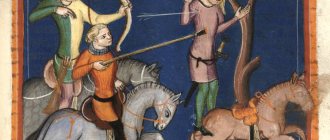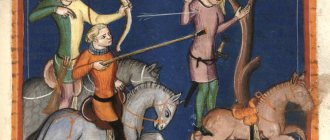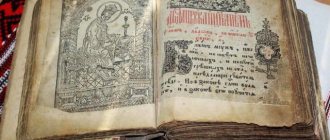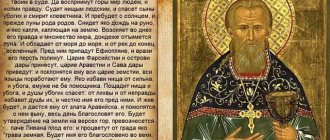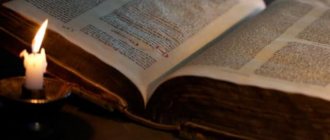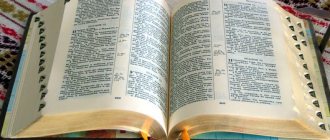Text of prayer Psalm 56
The song of praise is written in Hebrew. In churches, clergy use the text of Psalm 56 “For good luck in all matters” in Church Slavonic. At home, a believer can use Psalm 56 in Russian.
In Church Slavonic
In the end, don’t let David be corrupted, and the stranger run away from the face of Saul into the cave.
1 Have mercy on me, O God, have mercy on me, for my soul trusts in You, and I hope in the shadow of Your wing, until iniquity will pass away.
2 I will cry to God the Most High, the God who has done good to me.
3 God sent His mercy and His truth to those who trampled on me as a reproach, and saved me from heaven,
4 And deliver my soul from the midst of the Skimni. Pospah is confused, sons of humanity, the teeth of their weapons and arrows, and their tongue is a sharp sword.
5 Ascend into heaven, O God, and Thy glory be throughout all the earth.
6 You have prepared a net for my feet and made slush for my soul, digging a pit before my face and falling into it.
7 My heart is ready, O God, my heart is ready, I will sing and sing in my glory.
8 Arise my glory, arise psalms and harp, I will arise early.
9 Let us confess to You among the people, O Lord, I will sing to You among the nations,
10 For Thy mercy is magnified unto the heavens, and even unto the clouds Thy truth.
11 Ascend into heaven, O God, and Thy glory be throughout all the earth.
In Russian
56:1-4 To the head of the choir. Don't destroy it. Scripture of David when he ran away from Saul into the cave. 2 Have mercy on me, O God, have mercy on me, for my soul trusts in You, and in the shadow of Your wings I will hide until the troubles are past. 3 I will cry to the Most High God, the God who does good to me; 4 He will send from heaven and save me; He will put to shame the one who seeks to devour me; God will send His mercy and His truth.For execution. Don't destroy it. David, for the inscription on the pillar when he fled from the face of Saul into the cave.
1 Have mercy on me, O God, have mercy on me, for my soul trusts in You, and in the shadow of Your wings will I hope until iniquity has passed away.
2 I will cry to the Most High God, the God who has done good to me.
3 He sent from heaven and saved me, and gave me over to the reproach of those who trampled me. God sent His mercy and His truth
4 And I delivered my soul from among the young lions. I fell asleep troubled: the sons of men, their teeth are weapons and arrows, and their tongue is a sharp sword.
5 Ascend into heaven, O God, and throughout all the earth is Your glory.
6 They have prepared a net for my feet and have crushed my soul; They dug a hole in front of my face - and fell into it!
7 My heart is ready, O God, my heart is ready, I will sing and make melody to my glory.
8 Awake, my glory, awaken, psalter and harp. I'll wake up at dawn!
9 I will praise You among the nations, O Lord, I will sing praises to You among the nations.
10 For Your mercy is magnified to the heavens, and Your truth to the clouds.
11 Ascend into heaven, O God, and throughout all the earth is Your glory!
And again - David is on the run. Now from Saul. His shelter is a cave, trust in God and the opportunity to reflect. What is David thinking about? About the comfort in which he would like to live and the royal palaces? About a lot of gold, cattle, servants, beautiful maidens? No. David reflects on the fact that God will certainly send him His mercy and truth: his aspirations and thoughts are about the justice of God. David does not like this age - the age of accidents and injustice. He dreams of the future, of God's world order, where no one will be afraid of scoundrels. It is only in the wicked age that they often oppress God's servants. But times of change will come for everyone.
56:5 My soul is among the lions; I lie among those who breathe fire, among the sons of men, whose teeth are spears and arrows, and whose tongue is a sharp sword.
David, saying that his soul is among the lions, means himself surrounded by enemies, hunters for his life, for they too are essentially predators. Only their teeth are in the form of spears and arrows, and the tongue with which they wound David is like a sharp sword. All “hunters” of lives will wait for their time from God.
56:6,7 Be exalted above the heavens, O God, and let your glory be above all the earth! 7 They have prepared a net for my feet; my soul is drooping; They dug a hole in front of me, and [themselves] fell into it.
David is so sure of this that he already seems to see the very hole that they are digging for him, but it will be filled with David’s enemies. Although at the moment it is very difficult for him to endure the circumstances of the trap. Hope for liberation is a great force, and it doesn’t matter when this liberation comes, the main thing is that it will certainly come.
56:8 My heart is ready, O God, my heart is ready: I will sing and praise.
David's heart was ready to sing to the Lord and praise Him - despite the difficult circumstances. As we see, song and praise to God does not pour out from an unprepared heart: it must be a believer and a lover of God, filled with a song to God, so that there is something to pour out. But even difficult circumstances are not an obstacle to filling the heart and overflowing it with love for God.
56:9,10 Arise, my glory, arise, psalter and harp! I'll get up early. 10 I will praise You, O Lord, among the nations; I will sing Your praises among the nations,
David gives himself the command to perk up and cheer up: in order to endure everything and at the same time praise God not only with the words of the song, but also with resistance to trials, you need an optimistic attitude and a cheerful spirit. A depressed spirit is incapable of anything useful.
56:11,12 for Thy mercy is great unto the heavens, and Thy truth unto the clouds. 12 Be exalted above the heavens, O God, and let your glory be over all the earth!
David wants the God of mercy and truth to be known throughout the entire earth, and this will certainly happen one day. But not only will they learn about Him, the God of David will be exalted above heaven: everyone who should live in the world order of God will recognize that he alone is worthy of honor, praise and glory.
History of writing
The song was written by King David. Times were not easy, then the psalmist was hiding from King Saul. The author was in despair. It is believed that the text of Psalm 56 was written during the wanderings in the Adollam cave. Enemies and traitors were everywhere, King Saul sent many of his soldiers in search of David. At the moment of danger, David did not forget about his Lord; he prayed day and night for his salvation. It was the protection of the Almighty that helped David survive his exile.
A comment
The historical setting of this psalm, as indicated by its title, is David's flight to Gath, recorded in 1 Samuel 21:10–15.[3] This is a prayer for help against enemies attributed to royal rites, as indicated by the interpretation of "nations" in verse 7 as foreign enemies, references to national war in verses 1-2, 9, and vows and thanksgiving offerings (verse 12), which especially fit for a king, as well as references to “death” and “light of life” (verse 13) associated with royal imagery.[3]
Interpretation of Psalm 56
Many do not understand the meaning of the text in Church Slavonic. Let's consider the interpretation of the prayer:
Verses 1-3: The true righteous can always take refuge under the wing of the Lord. A believer can ask God for help at any moment. The Almighty takes care of everyone.
Verses 4-6: God will send his condescension and truth to the earth. Therefore, David received protection and help. He was undeservedly expelled from the country and doomed to wander for no reason. Verse five describes the enemies who were pursuing David. Even if the most difficult times have come, only the help of the Lord is capable of miracles.
Verses 7-8: Having found help, David also found peace of mind and his mood improved.
Verses 10-11: David praises God for his mercy. The last lines show us what love for the Lord can be.
Text
Hebrew Bible Version
The following is the Hebrew text of Psalm 56:[2]
| Poem | Hebrew |
| 1 | Please contact us ּֽאֱחֹ֨ז אוֹת֖וֹ פְלִשְׁתִּ֣ים בְּגַֽת |
| 2 | Home חֵ֥ם יִלְחָצֵֽנִי |
| 3 | Please contact us ֣י מָרֽוֹם |
| 4 | Please contact us |
| 5 | בֵּבָ֫ר֥וֹ בֵּֽאלֹהִ֣ים בָּ֖טַחְתִּי לֹ֣א אִירָ֑א מַה־יַּֽעֲשֶׂ֖ה בָשָׂ֣ר לִֽי |
| 6 | Home רָֽע |
| 7 | יָג֚וּרוּ יִצְפּ֗וֹנוּ (כתיב יִצְפֹּ֗ינוּ) הֵ֖מָּה עֲקֵבַ֣י יִשְׁמ ֹ֑רוּ כַּֽאֲשֶׁ֖ר קִוּ֣וּ נַפְשִֽׁי |
| 8 | | הוֹרֵ֬ד אֱלֹהִֽים |
| 9 | Please contact us ֗א רָתֶֽךָ |
| 10 | אָ֚ז | Please contact us ּי כִּֽי־אֱלֹהִ֥ים לִֽי |
| 11 | Please contact us |
| 12 | Please contact us ֽי |
| 13 | Please contact us |
| 14 | Home Home |
King James Version
Below is the complete English text of the Psalm from the King James Bible.
To the chief musician of Yonath-elem-rekokim, Michtam David, when the Philistines took him in Gath.
- Have mercy on me, O God, for man will consume me; he fights daily, oppresses me.
- My enemies shall daily consume me: for many fight against me, O Most High.
- When I'm afraid, I will trust you.
- In God I praise His word, I trust in God; I will not be afraid of what the flesh can do to me.
- Every day they tear out my words: all their thoughts are against me for evil.
- They gather together, they hide, they mark my steps as they wait for my soul.
- Will they be able to avoid lawlessness? in Thy wrath overthrow the people, O God.
- You tell of my travels; pour my tears into your bottle; aren't they in your book?
- When I call upon you, then my enemies will turn back: this I know; for me God.
- In God I will praise His word; I will praise His word in the Lord.
- I trust in God: I will not be afraid of what man can do to me.
- Your vows are upon me, O God: I will give You praise.
- For You have saved my soul from death; Won't you save my feet from falling, so that I can walk with God in the light of the living?
Numbering of verses
in the Hebrew Bible, Psalm 56:1 contains a designation
for the Chief Musician of Jonath-elem-rekokim, Michtam of David, when the Philistines took him at Gath.
(KJV)
From this point on, Psalm 56:1–13 in the English version corresponds to verses 2–14 in the Hebrew text.
Interpretation
Each verse of the psalm contains important information and a direct appeal to God:
- Verse 1-4: In David's time, waters were considered a symbol of trouble. He tells the Lord that the waters reached “his ears,” which means they blocked access to oxygen. Moreover, he goes deeper and deeper into the waters, and the ground under his feet is unsteady, so there is nothing to even lean on. At this time, David turns to the Lord with prayer, but “his throat is dry.” This means a strong cry addressed to the Creator, the highest level of tension in prayer.
- Verse 5: David talks about the number of enemies, which cannot be counted like the hairs of a head. About the requirement to answer for deeds and misdeeds that he did not commit. Saul said that David intended to kill him in order to gain power and control it alone. At the same time, David had already been anointed as king, but he did not at all think about the death of the former king. In fact, David's popularity among the people was determined by God, not by ambition.
- Verse 6-13: The author of Psalm 68 tells the Creator in plain text that he bears reproach for His sake. All of David’s sins are visible, and none of them were such that they caused persecution. At the same time, the author expresses the hope that his zeal for God will not cease, although it causes ridicule from idle people and relatives.
- Verse 14-19: The King of the Jews expresses hope for salvation from his enemies, and it will be sent down according to the great mercy of God, but not according to the merits of David. The psalmist asks for protection and salvation not for himself personally, but for the glory of the Lord, who has the power to protect his chosen one.
- Verse 20-22: David is comforted by what the Creator knows about his situation. How they gave him bile instead of food, and instead of food they gave him vinegar to drink. There is a direct analogy here with Jesus Christ, who was also mocked during his execution.
- Verse 23-29: Now the author of the psalm prays for reward for the enemies, so that the Lord would punish them, “bend their backs” and darken their eyes with grief, and the wicked would be deprived of their offspring. David calls to blot out the enemies of the Creator from the book of the living and the righteous.
- Verse 30-34: The author of the psalm assures the Lord that he will not tire of praising Him, communicating the goodness of God with words that are more exalted than the burnt offering of bulls. And the help of the Creator will instill joy in all those who seek God’s mercy.
- Verse 35-36: In anticipation of salvation, the psalmist encourages all who are on earth to praise the Lord.
We advise you to study Congratulations on St. Nicholas Day
The Story of Psalm 52
The interpretation of Psalm 52 echoes the 13th song. They were both written while David was being persecuted by King Saul, who understood that the psalmist had been appointed by God himself as his successor. However, he could not come to terms with this thought, and longed to destroy his potential rival.
The purpose of the psalm is to convict us of our sins, to make us repent and tremble, remembering them.
The text of Psalm 52 contains the contrition of the great king of Israel not about his misfortunes, but about the lack of piety and faith in the human race. While singing the psalm, we must mourn the disastrous degeneration of the world, the depravity of human nature, and at the same time rejoice, hoping for great salvation.
Interpretation
In the text of Psalm 65, verses 1-9 are addressed to the “nations”, verses 10-12 - to God.
- Verse 1-4: The whole earth (that is, all its inhabitants) is called to praise the Lord with joyful shouts and singing - because of the amazing works that have shown the world His incomparable power, which His enemies cannot resist.
- Verse 5-7: Examples of such actions are given by the Jews crossing the Red Sea, and then their crossing the Jordan River (verse 6). These amazing facts, like many others that took place in the history of His people, became the property of the pagans, surrounded by Israel, and this could not but make a strong impression on them. The psalmist calls on the pagan peoples to understand that in His power (verse 7) the God of the Jews rules... forever and over them; let the rebels not rise up! - he exclaims.
- Verse 8-9: Based on everything that was said before (the thought of the Lord’s preservation of the Jewish people is repeated: verse 9), the psalmist calls on all nations to glorify and praise Him (verse 8).
- Verse 10-12: Here the idea is conveyed in figurative form that through many difficult trials, dangers, hardships, slavery (put fetters on our loins), enemy sieges or siege (Put a man on our head; some believe that in Verse 12 implies the siege of Jerusalem under King Hezekiah by the Assyrian king Sennacherib - 2 Kings 18-19) the Lord conducted His people, subjecting them to a painful reworking for them (You... melted us down as silver is melted down: verse 10). But You then brought us to freedom, the psalmist exclaims with gratitude.
- Verses 13-15: In gratitude for deliverance (implied in verse 13; compare with “You have brought us into freedom” in the previous verse), the psalmist expresses his intention to enter the house of God with burnt offerings - in fulfillment of the vows he made in the days of his tribulation ( verse 14).
- Verse 16-20: A call to the Jewish people to come and hear what God had done for the psalmist through his prayer. I cried out to Him, and the Lord heard me and listened to the voice of my prayer, he says, because my heart was pure before Him (co. Prov. 28:9; Isa. 59:2). This part of the psalm emphasizes the idea of the need to “come” to the Lord with sincere prayer and a heart cleansed of sin. Only then does He hear and not turn away His mercy from the one who prays. Blessed be God, who hears and has mercy! - the psalmist concludes his song of thanksgiving.
What psalms to read for good luck
The Psalter is an amazing book and has a variety of texts for any life situation. Among the prayer texts there are many psalms for good luck and luck:
- 26, 37, 90 – for business owners;
- 3, 39, 10, 76 – to establish mutual relationships with employees, eliminate difficulties in communicating with management;
- 62, 73 – for help in finding a job;
- 52, 27 – for earning a large amount of money;
- 13, 24, 78, 143 - when there are doubts about making a decision;
- 1, 3, 9, 22, 99, 126 - for a successful resolution of the case and fulfillment of desire.
Psalms for money and luck:
- 37 - for settling matters and attracting money;
- 3, 27, 49, 52 - for monetary success;
- 16, 24, 119, 137 - to get out of difficult circumstances;
- 29, 44, 67, 29, 127 - for mutually beneficial cooperation;
- 14, 18, 73, 94 - to strengthen the case;
- 11, 47, 89, 93 - to get out of poverty;
- 7, 99, 138, 144 - for successful trading;
- 1, 6, 18, 133 - to get rid of money problems;
- 3, 5, 77, 110 - for a successful investment;
- 29, 54, 60, 81 - for good luck in business;
- 1, 15, 37, 48, 126, 22, 99 - for wealth;
- 3, 40, 69, 120 - from scammers and ruin;
- 53, 39, 15, 70 - to get rid of failures;
- 5, 43, 70, 84 - to overcome misfortunes;
- 4, 41, 59, 120 - for starting a business;
- 10, 39, 69, 84 - for the help of wealthy benefactors;
- 3, 5, 81, 122 - to give a loan;
- 45, 95, 39, 111 - so that all hopes come true.
Psalms for good luck at work:
- 31, 37, 49, 83 - for job search;
- 11, 18, 43, 56 - to select a target;
- 1, 99, 126, 150 - for high skill;
- 3, 8 30, 79 - to obtain leniency from the manager;
- 18, 30, 84, 127 - become successful in business;
- 78, 29, 130 - for choosing a profession;
- 3, 10, 39, 76 - for respect and honor in the service;
- 18, 44, 69, 137 - about choosing the right path;
- 33, 44, 75, 89 - eliminate nagging from the manager;
- 17, 31, 88, 126 - so that all relatives have a job;
- 19, 39, 126, 148 - so that colleagues do not envy and intrigue;
- 15, 67, 118, 120 - about hard work;
- 14, 27, 93, 131 - for learning a craft;
- 3, 44, 51, 100 - about a friendly team;
- 9, 17, 40, 49 - for honor and respect at work;
- 3, 72, 94 - from forgery and deception with documents;
- 17, 30, 61, 94 - for mutual understanding with the official.

